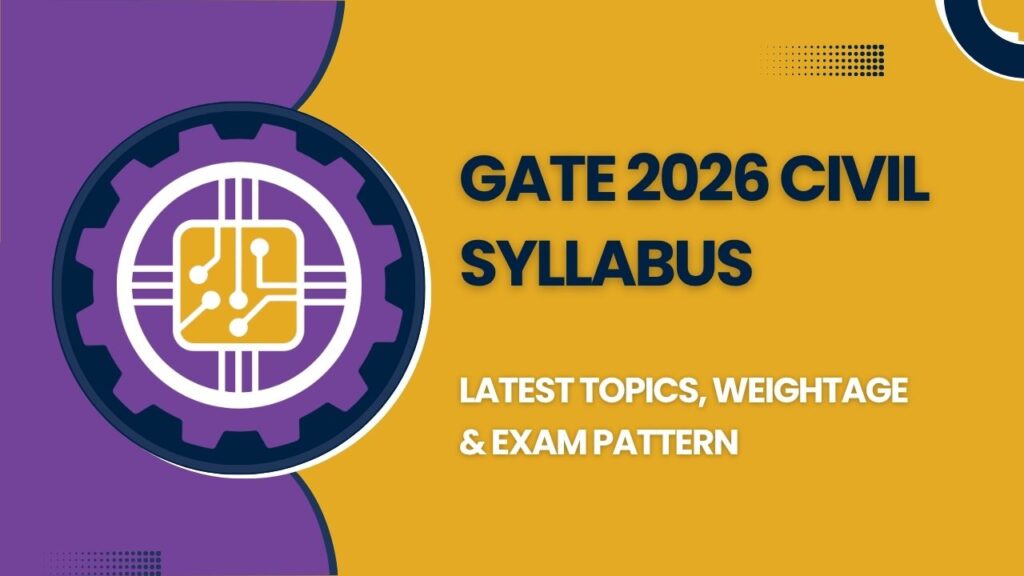This article will completely focus on the GATE 2026 Civil Syllabus. For graduates in civil engineering who want to pursue M.Tech/Ph.D. programs at IITs, NITs, and IISc or PSU positions, the Graduate Aptitude Test in Engineering (GATE) 2026 is a top exam. The seven main areas of the GATE Civil Engineering (CE) course assess both technical and analytical abilities. This blog offers a thorough examination of the GATE 2026 CE or Civil Engineering curriculum.
Also learn: GATE 2026 CSE Syllabus
GATE 2026 Civil Syllabus: Latest Topics, Weightage & Exam Pattern
Engineering mathematics, structural engineering, geotechnical engineering, water resources engineering, environmental engineering, transportation engineering, and geomatics engineering are the seven areas that make up the GATE 2026 CE syllabus. The syllabus is intended for a 100-mark exam, with Engineering Mathematics and General Aptitude (common to all exams) playing important roles. It is based on the GATE CE 2025 material that was released and is anticipated to be similar for 2026. The test assesses knowledge at the undergraduate level with MCQs, MSQs, and NATs.
Why Comprehend the Course Material? Understanding the GATE 2026 CE syllabus facilitates the identification of high-weightage subjects, allowing for targeted study and effective exam preparation.
GATE 2026 Civil Syllabus
General aptitude, engineering mathematics, and core disciplines are only a few of the many topics included in the GATE Civil Engineering Syllabus 2026. According to the GATE Civil Engineering Exam Pattern, there are 65 questions on the test, with a possible score of 100. To make sure they are not missing any sections, candidates must completely study the entire curriculum.
Aspirants must have a thorough understanding of the GATE CE Syllabus in order to plan their preparation and cover every subject. The GATE Civil Syllabus 2026 is broken down topic-by-topic in this post.
GATE 2026 Civil Syllabus: General Aptitude
The General Aptitude section of the GATE 2026 Civil Engineering syllabus assesses candidates’ verbal and numerical thinking skills. It attempts to assess their comprehension and application of written material, data analysis, problem-solving, and logical reasoning skills—all of which are necessary for success in a variety of technical disciplines.
| Topics | Syllabus |
|---|---|
| Verbal Aptitude |
|
| Quantitative Aptitude |
|
| Analytical Aptitude |
|
| Spatial Aptitude |
|
GATE 2026 Civil Syllabus: Engineering Mathematics
The engineering mathematics portion of the GATE Civil Engineering syllabus 2026 covers seven main topics: numerical methods, probability and statistics, complex variables, differential equations, linear algebra, calculus, and transform theory. As stated below, these concepts are further broken down into their corresponding subjects:
| Sub-topics | Syllabus |
|---|---|
| Linear Algebra |
|
| Calculus |
|
| Differential Equations |
|
| Vector Analysis |
|
| Complex Analysis |
|
| Probability and Statistics |
|
GATE 2026 Civil Syllabus: Core Subjects
To properly prepare for the test, candidates need to be aware of the GATE 2026 Civil Engineering Syllabus. The GATE syllabus for Civil Engineering is summarised in the table below:
| Subjects | Syllabus |
|---|---|
| Geotechnical Engineering |
|
| Structural Engineering |
|
| Water Resources Engineering |
|
| Environmental Engineering |
|
| Transportation Engineering |
|
| Geomatics Engineering |
|
GATE 2026 Civil Syllabus: Subject Wise Weightage
Candidates need to go over the material thoroughly and adjust their study plan as necessary. The GATE 2026 Civil Engineering syllabus weighting is shown in the table below.
| Subjects | Marks Weightage |
|---|---|
| General Aptitude | 15% |
| Engineering Mathematics | 10.5% |
| Irrigation & Hydrology | 5.5% |
| Fluid Mechanics | 9% |
| Environmental Engineering | 9% |
| Structural Analysis | 4.5% |
| Geotechnical Engineering | 16% |
| Transportation Engineering | 9.5% |
| Geomatics Engineering | 6% |
| R.C.C. | 5% |
| Steel Structures | 5% |
| Construction Materials & Management | 1% |
| Engineering Mechanics | 0.5% |
| Solid Mechanics | 3.5% |
GATE 2026 Civil Syllabus: Exam Pattern
Aspirants should go over the full exam pattern before beginning their GATE 2026 preparation. Candidates can learn comprehensive details about the GATE exam’s duration, total score, number of questions, and much more with the aid of the exam pattern for GATE 2026.
Candidates need to know the format of the exam in addition to the GATE syllabus for CE. The following table lists the specific GATE Civil Engineering Exam Pattern:
| Particulars | Details |
|---|---|
| Mode of Exam | Online |
| Number of Questions | 65 |
| Duration of Exam | 3 hours |
| Pattern of Questions |
|
| Marking Scheme |
|
| Number of Sections |
|
| Topic wise weightage |
|
